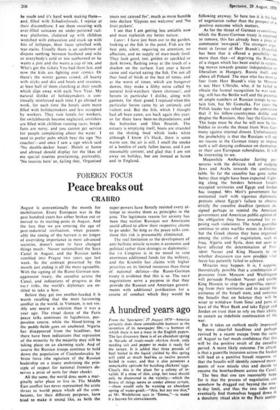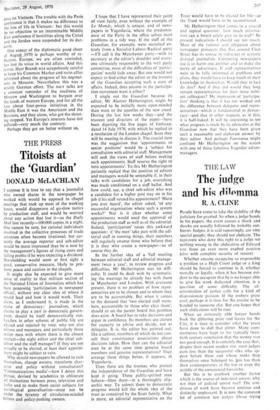FOREIGN FOCUS
Peace breaks out
CRABRO
August is conventionally the month for mobilisation. Every European war in the past hundred years has either broken out or moved to its starting-point in August. And the fact that we are entering the age of post-industrial civilisation, when presum- ably the timing of the harvest is no longer of overriding importance in most advanced societies, doesn't seem to have changed things much: Nasser nationalised the Suez Canal in August, and the Russian tanks rumbled into Prague two years ago last week. So the contrast presented by the month just ending is all the more agreeable. With the signing of the Russo-German non- aggression treaty, the ceasefire across the Canal, and indications of progress at the SALT talks, the world's diplomats are en- titled to take a bow.
Before they get too swollen-headed it is worth recalling that the most harrowing conflict in the world, in Vietnam, is not vis- ibly any nearer a solution than it was a year ago. The ritual dance of the Paris peace talks continues its lugubrious, pur- poseless course, while the blood-letting in the paddy-fields goes on unabated. Nigeria has disappeared from the headlines, but there have been indications that repression of the minority by the majority may still be taking place on an alarming scale. And of course the Russian troops continue to hold down the population of Czechoslovakia by brute force (the signature of the Russian leadership on a treaty enshrining the prin- ciple of respect for national frontiers de- serves a prize of sorts for sheer cheek).
All the same, the world does seem a mar- ginally safer place to live in. The Middle East conflict has never represented the acute threat to world peace which all the com- batants, for their different purposes, have tried to make it sound like, as both the
super-powers have fiercely resisted every at- tempt to involve them as principles in the area. The legitimate reason for anxiety has been that neither Russians nor Americans could afford to allow their respective clients to go under. So long as the peace talks con- tinue this risk is presumably eliminated.
The real limitation to the development of anti-ballistic missile systems is economic and political rather than strategic or diplomatic: the us Congress is in no mood to vote enormous additional funds for the military, and the Kremlin has claims with higher priorities on its limited resources than those of national defence—the Russo-German treaty is evidence that this is so. The SALT negotiations serve a purpose in that they ,provide the Russian and American govern- ments with additional justification for a course of conduct which they would be
following anyway. So here too it is the fact of negotiation rather than the prospect of a positive outcome which matters.
As for the threat of German revanchistne which the Russo-German treaty is supposed to remove, this has already been a piece of communist 'newspeak'. The strongest argu- ment in favour of Herr Brandt's Oxrpoliiik has been that it offered a possibility-00 more than that—of depriving the Russians of a slogan which has been useful in surpris- Mg moves towards greater independence or liberalism in Hungary, Russia itself, and above all Poland. The man who has most to fear from Herr Brandt's visit to Moscow is not Herr Ulbricht, who, if he failed to obtain the formal recognition he was seek- ing,-still has the Berlin wall and the presence of ample numbers of Russian troops to sus- tain him, but Mr Gomulka. For years the Polish leader has relied upon the conviction that if his fellow-countrymen dislike and despise the Russians, they fear the Germans. The hope must be that he will now be for- bidden to invoke the threat from West Ger- many against internal dissent. Unfortunately the probability is that the Russians will see no reason in the German treaty to impose such a self-denying ordinance on themselves or their east European subordinates. It will be interesting to see.
Meanwhile Ambassador Jarring per- severes with the delicate task of nudging Jews and Arabs towards the conference table. So far the ceasefire has gone rather better than might have been expected. Fight- ing along the borders between Israel's occupied territories and Egypt and Jordan has stopped. -Mrs Meir's government has contented itself with vigorous diplomatic protests about Egypt's failure to observe strictly the ceasefire deadline (protests de- signed perhaps to remind the American government and American public opinion of the obligation they have assumed for ex- posing such violations). The Arab guerrillas continue to utter warlike noises in Jordan: but the Greek chorus they have organised among the critics of negotiation, such as Iraq, Algeria and Syria, does not seem to have affected the determination of Pres- ident Nasser and King Hussein to see whether discussion can now produce what force has patiently failed to achieve.
Miracles may happen. It is, I suppose. theoretically possible that a combination of pressures from Moscow and Washington will persuade President Nasser and enable King Hussein to stop the guerrillas operat- ing from their territories and to accept the existence of the Israeli state, and convince the Israelis that on balance they will be wiser to withdraw from Sinai and parts at least of the West Bank and take Egypt and Jordan on trust than to rely on their ability to sustain an indefinite continuation of the war.
But it takes an outlook easily impressed by more cheerful headlines and perhaps revived by a recent escape from the rains of August to feel much confidence that this will be the positive result of the ceasefire period. A more likely outcome. I'm afraid. is that a guerrilla incursion across the Jordan will lead to a punitive Israeli response. or that the Israelis will identify renewed move- ments of SAM missile sites and decide to resume the bombardment across the Canal.
The best that one can reasonably hope for is that the process of negotiation can somehow be dragged out beyond the nine- ty-day limit, and that the two sides may eventually find themselves bogged down in a desultory ritual akin to the Paris confer-
ence on Vietnam. The trouble with the Paris conference is that it makes no difference to the loss of life in Vietnam: but this would be no objection to an interminable Middle East conference if hostilities along the Canal and the Jordan were suspended for its dur- ation.
One aspect of the diplomatic good cheer of Augua_1970 is perhaps worthy of re- flection. Europe, we are often reminded, has lost its voice in world affairs. And this is true. Herr Brandt was scrupulously careful to keep his Common Market and NATO allies informed about the progress of his negotat- ions in Moscow. Nevertheless this was a strictly German effort. The SALT talks are a constant reminder of the readiness of
Moscow and Washington to bargain over the heads of western Europe, and for all the fuss about four-power initiatives in the Middle East it was the Americans and the Russians, and they alone, who got the shoot- ing stopped. Yet Europe's interests have not suffered—very much the contrary.
Perhaps they get on better without us,































 Previous page
Previous page